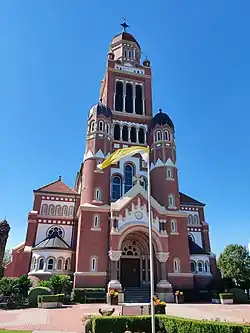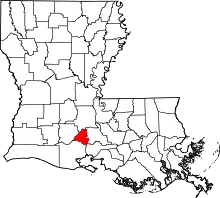| St. John's Cathedral | |
|---|---|
 Front façade | |
| Location | 515 Cathedral Street Lafayette, Louisiana |
| Country | United States |
| Denomination | Roman Catholic |
| Website | www |
| History | |
| Status | Cathedral |
| Dedicated | June 27, 1916[1] |
| Architecture | |
| Functional status | Active |
| Style | Romanesque Revival |
| Specifications | |
| Number of towers | 1 |
| Administration | |
| Province | New Orleans |
| Diocese | Lafayette (Louisiana) |
| Clergy | |
| Bishop(s) | J. Douglas Deshotel |
| Rector | Rev. Chester Arceneaux[2] |
| Priest(s) | Very Rev. Chester C. Arceneaux, V.F. |
St. John's Cathedral | |
 | |
| Location | 515 Cathedral Street, Lafayette, Louisiana |
| Coordinates | 30°13′22″N 92°01′25″W / 30.22291°N 92.0235°W |
| Area | 7 acres (2.8 ha) |
| Built | 1916 |
| Architect | Cousin |
| Architectural style | Romanesque Revival |
| NRHP reference No. | 79001067[3] |
| Added to NRHP | July 27, 1979 |
The Cathedral of Saint John the Evangelist or La Cathédrale St-Jean, originally called l'Église St-Jean du Vermilion, is the cathedral and mother church of the Roman Catholic Diocese of Lafayette in Louisiana. It was the first parish in Lafayette Parish—founded in 1821—and was designated cathedral upon the erection of the diocese in 1918.[4][5]
The historic church—located at 515 Cathedral Street in downtown Lafayette—is the third structure built on the site. The land was donated in 1821 by Jean Mouton, a wealthy planter who had founded the town as Vermilionville.[6] The cornerstone was laid in 1913, and the church was completed in 1916 in the Dutch Romanesque Revival style. A large red and white brick structure, its notable features include stained glass produced in Munich depicting the life of the patron, oil paintings of Christ and the Apostles, and a Casavant Frères organ.[4][5]
St. John's Cemetery is the oldest in the city of Lafayette.[7] Notable burials include Jean Mouton, who donated the property for the church; his son Alexandre Mouton, a U.S. senator and governor of Louisiana; his grandson Alfred Mouton, a Confederate general in the American Civil War; and Jefferson Caffery, a distinguished U.S. diplomat who was a Lafayette native.
The church and a 7 acres (2.8 ha) area comprising the Bishop's residence and the cemetery was listed on the National Register of Historic Places on July 27, 1979.[3]
See also
References
- ↑ "Cathedral of St. John the Evangelist celebrates 100 year dedication". KLFY-TV. June 27, 2016.
- ↑ "Parish Staff". saintjohncathedral.org.
- 1 2 "National Register Information System". National Register of Historic Places. National Park Service. November 2, 2013.
- 1 2 "St. John's Cathedral" (PDF). State of Louisiana's Division of Historic Preservation. Retrieved July 9, 2018. with two photos and a map
- 1 2 Ms. Beverly Latimer. "National Register of Historic Places Inventory/Nomination Form: St. John's Cathedral". National Park Service. Retrieved July 9, 2018. With seven photos from 1979.
- ↑ Louisiana Department of Culture, Recreation and Tourism. "Cathedral of Saint John".
- ↑ "Cathedral of St. John the Evangelist". Saintjohncathedral.org. May 30, 2008. Retrieved December 2, 2016.
External links



